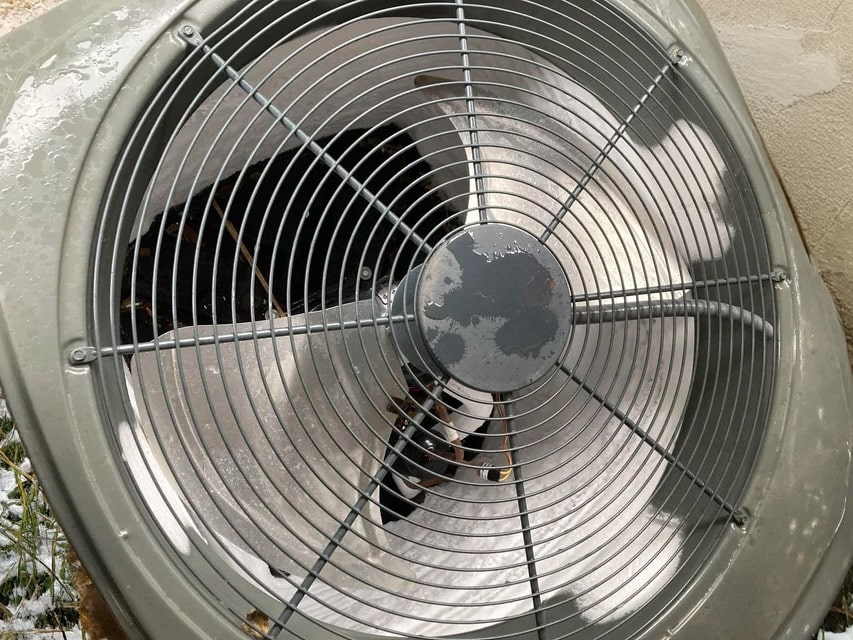Have you ever wondered if running your AC and fan at the same time really helps you stay cooler? It sounds like a smart idea—after all, both cool the air, right?
But what if using them together is actually hurting your comfort and your energy bill? If you want to save money, stay comfortable, and get the most out of your cooling devices, you need to know why combining an AC and fan might not be the best move.
Keep reading to discover the surprising reasons behind this common mistake and learn how to cool your space smarter.
Energy Consumption Of Air Conditioners
Understanding the energy consumption of air conditioners is key to managing your electricity bills and reducing your environmental impact. Many people assume running an AC and a fan together saves energy, but this combination can be misleading. Let’s look closer at how air conditioners consume energy and what that means for your usage habits.
How Air Conditioners Work
Air conditioners cool your room by removing heat from the indoor air and releasing it outside. They use a refrigerant cycle involving compressors and coils to achieve this cooling effect. The process requires a significant amount of electricity, especially during hot days when the unit works harder.
Fans, on the other hand, don’t cool the air; they only move it around. This movement can make you feel cooler through evaporation of sweat, but the actual air temperature remains the same. Running a fan with an AC doesn’t reduce the AC’s workload; it simply circulates the cooled air.
Average Energy Usage Of Ac Units
The energy consumption of an air conditioner varies depending on its size, efficiency, and usage patterns. On average, a typical window AC unit consumes between 500 to 1500 watts per hour. Central air systems can use even more, sometimes over 3500 watts per hour.
- Smaller AC units (5,000-8,000 BTU) usually consume less energy but are suitable only for small rooms.
- Medium-sized units (10,000-15,000 BTU) are more common and consume around 1000 watts per hour.
- Larger units or central systems can significantly increase your electricity bill if run continuously.
Have you noticed how your AC’s energy use spikes during peak heat? That’s when the compressor runs non-stop, consuming more power. Combining a fan with the AC might seem smart to you, but it can make the AC work harder if you lower the thermostat too much, increasing energy use rather than saving it.

Credit: www.amazon.ca
Role Of Fans In Cooling
Fans play an important role in cooling spaces by moving air around. They do not lower the temperature but create a breeze that helps the body feel cooler. Understanding how fans work can help explain why using them with air conditioners might not be the best idea.
Mechanism Of Fans
Fans work by rotating blades that push air forward. This movement creates airflow, which helps evaporate sweat from the skin. The evaporation cools the body naturally. Fans do not cool the air itself; they only circulate it. This makes fans effective in dry heat but less so in very humid conditions.
Energy Efficiency Of Fans
Fans use much less electricity compared to air conditioners. They consume between 10 to 15 times less energy. This makes fans an eco-friendly and low-cost option for cooling. Running a fan alone can reduce energy bills significantly. Fans are best used in moderately warm weather or with open windows for fresh air.
Impact Of Using Ac And Fan Together
Using an air conditioner and a fan together might seem like a good way to stay cool. However, this combination can lead to unexpected consequences that affect your energy bills and the efficiency of your cooling system. Understanding these impacts helps you make smarter choices for your comfort and savings.
Increased Energy Consumption
Running both the AC and fan at the same time increases your electricity use. The fan circulates air, which can make the AC work harder to maintain the set temperature.
This extra effort means your energy bills can rise significantly without a noticeable improvement in comfort. Have you noticed your electricity cost spiking during summer despite using both devices?
Overlap In Cooling Functions
Both the AC and fan aim to cool your space but in different ways. The AC removes heat and moisture from the air, while the fan moves air around to create a breeze.
Using them together causes overlapping functions that don’t necessarily complement each other. Instead, the fan can interfere with the AC’s airflow pattern, reducing its ability to cool efficiently.

Credit: www.yahoo.com
Financial Implications
Understanding the financial implications of running your AC and fan together can help you make smarter decisions about your energy use. Many people believe that using both simultaneously will cool the room faster or save money, but this isn’t always true. Let’s break down the costs and see where your money really goes.
Cost Analysis Of Combined Usage
Running an air conditioner alongside a fan might seem like a good idea to cool your space quickly. However, both appliances draw power, and combined usage increases your electricity bill significantly. The fan circulates air but does not lower the room temperature, so the AC works harder to maintain the set temperature.
Here’s a simple comparison:
| Appliance | Average Power Consumption (Watts) | Usage Duration (Hours) | Estimated Cost per Day ($) |
|---|---|---|---|
| AC Alone | 1500 | 8 | 1.44 |
| Fan Alone | 75 | 8 | 0.07 |
| AC + Fan Together | 1575 | 8 | 1.51 |
Notice that running both together raises your daily cost. Over a month, this small difference adds up to a noticeable extra expense. Does that quick burst of cooling feel worth the extra charge on your bill?
Potential Savings By Using Separately
Using your fan and AC separately can help you save money without sacrificing comfort. Fans use very little power and can keep you cool when the temperature isn’t too high. Turning off the AC and running just the fan during cooler parts of the day can cut your electricity costs drastically.
- Use the fan alone during early mornings or evenings.
- Switch on the AC only when temperatures rise significantly.
- Combine fan and AC only when absolutely necessary, and for short periods.
By adjusting your usage habits, you can avoid unnecessary power consumption. Have you ever timed how long you really need the AC on during the hottest hours? Small changes can lead to big savings.
Environmental Concerns
Environmental concerns are a crucial reason to reconsider using an AC and fan together. At first, it might seem like a smart way to stay cool while saving energy. However, this combination can actually lead to unintended negative effects on the environment.
Carbon Footprint Increase
Running both your air conditioner and fan at the same time increases electricity consumption. This means more power is drawn from energy sources, many of which still rely on fossil fuels.
Higher electricity use directly results in a larger carbon footprint. Even if your fan uses less power, the AC demands significant energy, and using both intensifies this effect. Have you thought about how much extra carbon dioxide your home releases just by doubling up on cooling devices?
Sustainability Challenges
Using an AC and fan together also creates challenges for sustainable living. The extra energy demand pressures power grids and increases reliance on non-renewable energy.
It works against efforts to reduce global warming and conserve resources. Instead of combining these appliances, you could choose one efficient cooling method that aligns better with sustainability goals.
What small changes can you make in your cooling habits that help protect the planet without sacrificing comfort?
Effective Cooling Alternatives
Using air conditioners and fans together may seem like a good idea. Yet, it often wastes energy and reduces cooling efficiency. There are better ways to cool your space effectively without running both at the same time. These alternatives help you save power and stay comfortable.
Optimizing Ac Usage
Set the AC temperature to a comfortable level, around 24-26°C. Avoid setting it too low. This saves energy and prevents the room from becoming too cold. Close doors and windows to keep cool air inside. Clean or replace AC filters regularly for better airflow. Use a timer or smart thermostat to run the AC only when needed.
Enhancing Fan Efficiency
Use fans to circulate air and help cool the body. Ceiling fans should spin counterclockwise in summer. This pushes cool air down. Place fans near open windows to bring fresh air inside. Use portable fans to direct airflow where you sit or sleep. Fans use less electricity and can reduce the need for AC.
Expert Recommendations
Experts advise against running an air conditioner and fan at the same time. This combination can cause your system to work harder, raising energy costs and reducing efficiency. Understanding expert advice helps you keep your home cool without wasting power or harming your cooling devices.
Best Practices For Home Cooling
- Use fans to circulate air only when the AC is off.
- Set the air conditioner temperature to a comfortable but efficient level.
- Close windows and doors to keep cool air inside.
- Maintain your AC unit regularly to ensure top performance.
- Use ceiling fans to help cool the room before turning on the AC.
Innovative Cooling Solutions
New cooling technologies reduce energy use and improve comfort. Smart thermostats adjust temperatures based on your schedule. Evaporative coolers work well in dry climates without high energy demands. Portable AC units offer flexible cooling in specific areas. Combining these options wisely helps you stay cool efficiently and affordably.

Credit: www.watkinsheating.com
Frequently Asked Questions
Can I Use Ac And Fan Simultaneously?
Using AC and fan together can reduce AC efficiency. Fans circulate air but don’t cool it, causing energy waste and higher bills.
Does Running Fan With Ac Save Electricity?
No, running fan with AC increases electricity use. The fan adds power consumption without improving cooling, leading to higher energy costs.
Why Does Ac Performance Drop With Fan On?
Fan airflow interferes with AC’s cold air distribution. This causes uneven cooling and forces AC to work harder, reducing its performance.
Is It Bad For Ac To Use Fan Together?
Yes, it can strain your AC system. The fan’s airflow disrupts temperature sensors, making AC cycle inefficiently and wear out faster.
Conclusion
Using an AC and fan together wastes energy and money. Fans cool people, not rooms, so AC works harder. This raises electricity bills and strains your system. Choose one for better comfort and savings. Simple steps like this help keep your home cool and costs low.
Think smart, stay comfortable without extra effort.

Home Improvement Specialist & Writer at HomeFixio
Caden Rutherford is a seasoned home improvement specialist with extensive hands-on experience in residential construction, renovations, and design. With a keen eye for detail and a passion for transforming spaces, Caden shares practical advice and expert solutions to enhance the functionality and beauty of homes. As a writer for HomeFixio, Caden combines technical knowledge with creative flair, providing readers with informative guides on everything from structural improvements to aesthetic upgrades, empowering homeowners to achieve their ideal living spaces.